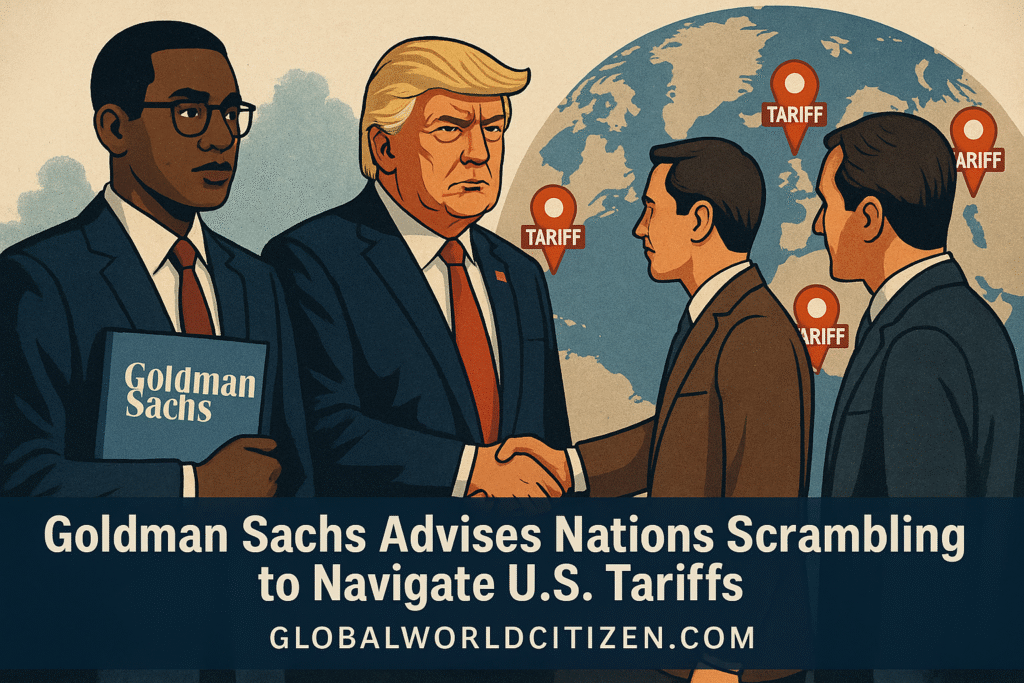Published Date: April 28, 2025 ✍️ Author: Global Trade & Finance Desk 🌐 Source: GlobalWorldCitizen.com
As President Trump’s return to the White House reshapes global trade dynamics, countries around the world are quietly turning to Wall Street powerhouses like Goldman Sachs for behind-the-scenes guidance on how to avoid being hit with punitive U.S. tariffs. From South Africa to Japan, governments are now seeking financial advice not just on markets — but on how to politically manage relations with the White House.
 South Africa Turns to Goldman Sachs Amid Tariff Threats
South Africa Turns to Goldman Sachs Amid Tariff Threats
Faced with the looming threat of U.S. tariffs, South African President Cyril Ramaphosa and senior officials began consulting Goldman Sachs in February 2025, hoping to avoid further deterioration in trade relations with Washington.
Key Issues in the Talks:
Goldman reportedly advised South Africa to consider adjustments to its Black ownership laws and the controversial land redistribution bill, both of which drew condemnation from President Trump and U.S. business leaders.
Trump labeled the land law a “human rights violation,” echoing Elon Musk’s claim that it was “racist” toward white South Africans.
In March, Trump’s administration expelled South Africa’s ambassador, citing “government-sponsored race-based discrimination.”
“We’re committed to transformation that redresses apartheid-era inequality,” said a South African spokesperson, pushing back on Goldman’s suggestions.
 Goldman Sachs, Wall Street, and Tariff Strategy: A New Role in Global Diplomacy
Goldman Sachs, Wall Street, and Tariff Strategy: A New Role in Global Diplomacy
Goldman Sachs is now acting as a backchannel advisor to multiple governments, including:
France
Saudi Arabia
Japan
The bank’s role involves providing insights on:
How to structure symbolic policy concessions to gain favor with the Trump administration
Navigating non-trade-related triggers that can impact U.S. tariff decisions
Forecasting which countries are likely to face tariffs next
This new advisory landscape underscores how tariff diplomacy under Trump is being shaped by political signals, not just economic models.
 Reciprocal Tariffs and High-Stakes Negotiations
Reciprocal Tariffs and High-Stakes Negotiations
In early April, the Trump administration imposed reciprocal tariffs of 31% on South Africa, calling it one of the “worst offenders” in global trade.
A 90-day pause was granted shortly afterward.
Goldman told clients that the pause could be extended if countries show “sufficient progress” in negotiations.
Tariff announcements are being held back, with plans for a mass rollout of multiple trade deals starting in July.
“Everything comes down to how Trump perceives your country,” said one executive briefed on the talks.
 Wall Street Banks Are the New Trade Whisperers
Wall Street Banks Are the New Trade Whisperers
At the IMF Spring Meetings in Washington, closed-door strategy sessions were hosted by top banks:
JPMorgan Chase hosted a private talk where Treasury Secretary Scott Bessent said U.S.–China trade negotiations would last 2–3 years.
Jamie Dimon, CEO of JPMorgan, told investors the best-case scenario was a mild U.S. recession.
Vietnam is negotiating a reduction from 46% in reciprocal tariffs, while
Japan is working to address currency policy disputes with the U.S.
Bank of America also arranged high-level client briefings with officials from the National Economic Council, according to people familiar with the meetings.
 GWC Insight: The Rise of Financial Influence in Global Geopolitics
GWC Insight: The Rise of Financial Influence in Global Geopolitics
At GlobalWorldCitizen.com, we’re witnessing the blurring of lines between finance and foreign policy. What once belonged to diplomats now sits on the desks of Wall Street executives, who are shaping the strategies of nations in trade negotiations.
Key Takeaways for Global Citizens:
Tariff diplomacy is now personality-driven — not purely economic
Wall Street banks are now global policy consultants
Countries must balance sovereignty with access to U.S. markets
One misstep — even symbolic — can trigger massive economic consequences

